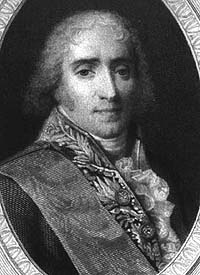Hugues-Bernard Maret
| Duc de Bassano | |
|---|---|
 |
|
| 12th Prime Minister of France | |
|
In office 10 November 1834 – 18 November 1834 |
|
| Monarch | Louis Philippe I |
| Preceded by | Comte Gérard |
| Succeeded by | Duc de Trévise |
| Personal details | |
| Born |
1 May 1763 Dijon |
| Died | 13 May 1839 (aged 76) Paris |
Hugues-Bernard Maret, 1st Duc de Bassano (1 May 1763 – 13 May 1839) was a French statesman, diplomat and journalist.
Born at Dijon in Bourgogne, he received a solid education, and then entered the legal profession – becoming a lawyer at the King's Council in Paris. The ideas of the French Revolution profoundly influenced him, wholly altering his career.
The interest aroused by the debates of the first National Assembly suggested to him the idea of publishing them in the Bulletin de l'Assemblée. The journalist Charles-Joseph Panckoucke (1736–1798), owner of the Mercure de France and publisher of the famous Encyclopédie (1785), persuaded him to merge this in a larger paper, the Moniteur Universel, which gained a wide repute for correctness and impartiality.
He was a member of the moderate club, the Feuillants, but, with the overthrow of the monarchy and the Insurrection of 10 August, 1792 he accepted a post in the Ministry of Foreign Affairs, where he sometimes exercised a steadying influence. On the withdrawal of the British legation, Citizen Maret (as he was then known) went on a mission to London, where he had a favourable interview with William Pitt the Younger on 22 December 1792 – all hope of an accommodation was, however, in vain. After the execution of Bourbon King Louis XVI (21 January 1793), the chief French diplomatic agent, Bernard-François de Chauvelin, was ordered to leave Britain, while the National Convention declared war (1 February 1793 – see French Revolutionary Wars: Campaigns of 1793). These events limited the impact of Maret's second mission to London in January 1794.
...
Wikipedia
